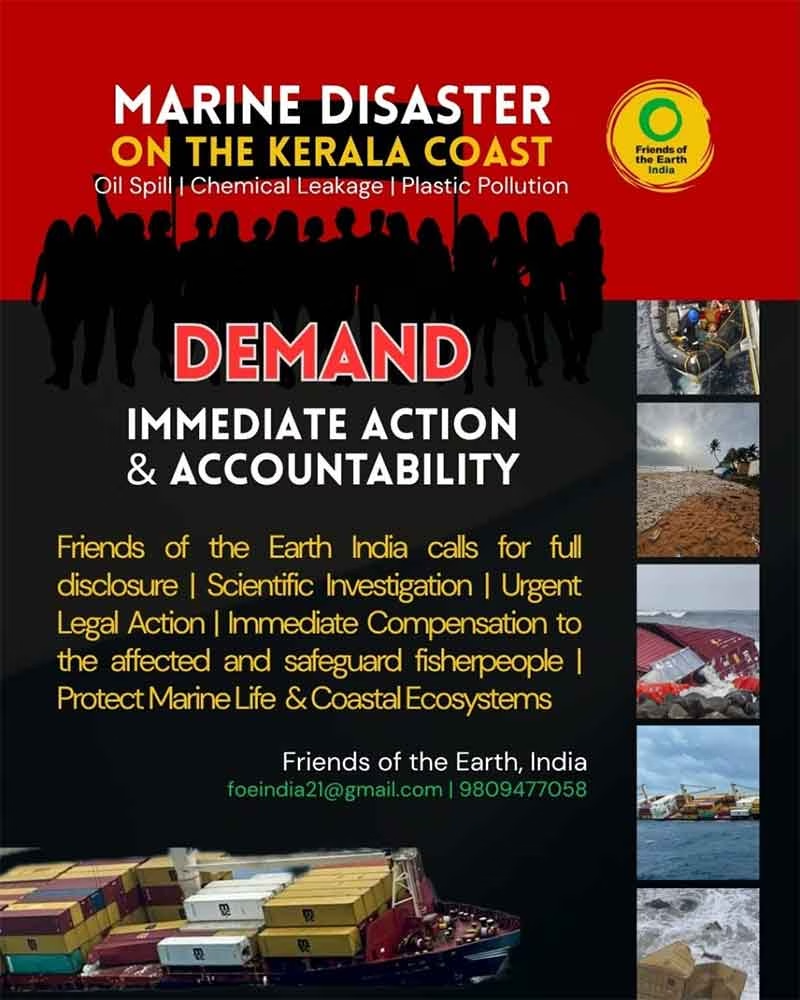Friends of the Earth, India Demands Full Disclosure, Accountability, and Immediate Measures to Protect the marine ecosystems and livelihoods of Fisherpeople Following Shipwreck and Chemical Spill in Kerala Coast.

Friends of the Earth, India expresses deep concern over the recent shipwreck (Liberian cargo ship MSC ELSA 3) and the reported spillage of oil and hazardous chemicals off the Kerala coast. Reports indicate that floating containers are drifting toward the southern coasts, particularly Kollam, Thiruvanathapuram and Kanyakumari, raising serious environmental and livelihood concerns.
According to available information, the sunken commercial ship was carrying 640 containers at the time of the incident, including 13 containers with hazardous cargo and 12 with calcium carbide. Calcium Carbide is highly reactive with seawater, with disastrous impacts to the ecology. The ship was also carrying 84.44 metric tonnes of diesel and 367.1 metric tonnes of furnace oil, which may have leaked into the sea, creating an oil slick. Calcium carbide reacts with water to produce acetylene gas, which is highly flammable and can cause explosions. The oil spill, chemical leaks and plastic pollution pose a direct threat to marine life, potentially harming fish and marine animals and destabilizing the delicate marine ecosystem.
According to the 1992 International Civil Liability Convention, strict liability must be imposed on the shipowner for any pollution arising from the ship and any damage caused to natural resources or human health, except in cases of war, civil unrest, or natural disasters. The 1993 Braer incident, the 2006 Solar 1 shipwreck near Guimaras Island in the Philippines, the 2007 Hebei Spirit incident in South Korea, and the 2011 TK Bremen shipwreck in Lorient, France, are all examples where compensation was obtained from shipowners for damage caused to local communities and the marine environment due to ship-related pollution.
We demand that Vizhinjam Port authorities immediately disclose the nature of the hazardous materials on board, as such information should have been provided to port authorities in advance. It is imperative that fishing communities are informed about safety measures and the potential impact of the spill. The timing of this disaster, coinciding with the fish breeding season, further endangers the region’s already fragile fisheries.
We call upon the Indian Navy and Coast Guard to take immediate steps to Contain the spill, track the movement of the oil and hazardous containers, and mitigate the spread of contamination, especially given the strong monsoon currents that can accelerate the dispersion. Containers carrying sacks of polyethylene and polypropylene have washed ashore, scattering plastic pellets along the shoreline. There are growing concerns that these pellets could enter the food chain, as small fish may consume them, eventually reaching humans. It is essential that the coast and sea be cleaned immediately and regularly to minimize the harm caused by these plastics.
Fishing communities were never informed about the risks posed by this vessel or its planned route. This lack of public disclosure, transparency and preparedness highlights the systemic disregard for the rights and safety of coastal communities by both authorities and commercial interests.
Within a month of the inauguration of the deep-sea transhipment port, an accident of this scale can only be taken as a warning! Such accidents in the sea, leaves irrevocable and lasting damage to the maritorial ecology. It is criminal neglect that the Kerala State Pollution Control Board does not have an oil spill contingency plan with 9 of the 14 districts in the oil spill prone area. The long-term health, economic and social impacts are faced by the coastal communities, the state government should take measures to prevent such impacts and to ensure the safety of the communities.
This is not just an accident—it is the consequence of regulatory failure and negligence. It underscores the urgent need for a comprehensive ocean safety policy that prioritizes both marine ecosystems and the communities that depend on them. We call upon all relevant authorities—state and central governments, the Navy, and the Coast Guard—to urgently contain the spill and begin clean-up operations. Our oceans are not dumping grounds. Those responsible for these regulatory lapses must be held accountable.
Friends of the Earth India, reiterates that the sea and coasts belong to the fishing and coastal communities of this country and mindless development will only pave way for more such disasters! It is in the custodianship of the indigenous communities that natural resources be made sustainable!
OUR DEMANDS:
- Immediate and transparent disclosure of the nature and quantity of the chemicals involved, along with their impact on the coastal ecosystem and fisheries.
- Urgent containment of the spill and real-time tracking of the drifting containers, with frequent communication to the public and fishing communities on its impacts and threats.
- Formulation of safety protocols and emergency response mechanisms to address the immediate and long-term impact on marine ecosystems.
- Compensation for fishing communities for lost fishing days, and recovery costs to be charged to the responsible shipping company to support fisheries restoration.
- Immediate and regular clean-up of the coast and setting up of monitoring mechanisms with local fishing communities to monitor impact.
- An independent inquiry into the causes of the shipwreck, including whether the shipping channel is safe for container transport, whether all safety regulations were followed, and whether the vessel had valid fitness certification and was seaworthy.
Subscribe to Our Newsletter
Get the latest CounterCurrents updates delivered straight to your inbox.
Published By
Sarath Cheloor
National Coordinator
Friends of the Earth, India















































